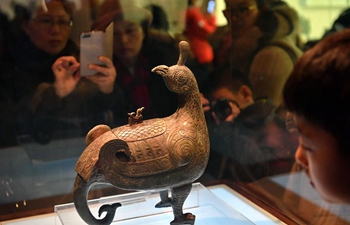SHENYANG, Feb. 10 (Xinhua) -- With big round eyes, pricked ears, short stocky legs, and a lovely butt, Qiu Lijun's Corgi named "Thirteen" is one of China's less than ten hearing-ear dogs.
When the dog hears a knock on the door, it does not bark but run about in the room to draw Qiu's attention. When the alarm clock rings, it will stand in front of Qiu's bed, with its paws patting to wake her up.
For daily routines that ordinary people take for granted, such as picking up what you have dropped accidentally, responding to the knocking on doors, and evacuating as soon as you hear the siren, the hearing-impaired like Qiu have to depend on the guide dog.
In places where it is not convenient to wear the cochlear implant, including those with the strong magnetic field or complex and noisy background sound, or places that are prone to lose or damage of the equipment, Thirteen is the only one that Qiu can depend on.
"I had lived in a silent world without any sounds, which caused a lot of troubles for my life. It was Thirteen who rescued me," said Qiu.
THE LUCKY DOG
To many people, the number thirteen is synonymous with bad luck. But the two-year-old Corgi Thirteen has brought more than good luck to Qiu, 66, who lives in northeast China's Liaoning Province.
In May 2018, Qiu received the working dog at a donating ceremony held by the Beijing disabled persons services center.
At that time, Thirteen had been trained for about 8 months in the Beiliu working dog training center.
"Thirteen is a Welsh Corgi, which belongs to the small dogs. Corgi has a stable and calm character, not that neurotic like other small dogs. They are very bold and alert, and can guard their homes with great vigilance," said Song Yi, general manager of the center.
A hearing-ears dog need to be healthy, sensitive to sounds, and to have stable characters with no record of attacking people within its three generations.
The center will first test the dogs' sensitivity to sounds by playing the harmonica and tapping on the metals. After the screening process, the guide dogs generally need to go through about 10 months of training to help them distinguish a variety of daily sounds, such as alarms, knocking, fire, laughters, baby cries, and to react in a timely manner when dealing with car horns and the sound of boiling water.
The dogs also learn about how to get along with people and to call for help when their owners are in danger.
Because the dogs mainly serve the hearing-impaired who cannot train them on their own while it is easy for the dogs to forget some of its training contents, the training center also takes the dogs back for training consolidation on a regular basis.
Therefore, the training cost of a hearing-ear dog can exceed 400,000 yuan (about 58,900 U.S. dollars), said Song.
"I was so lucky to meet Thirteen," Qiu said.
LEADING TO WORLD OF SOUNDS
"Hearing-impaired people like me cannot 'see' when encountering our acquaintances. That's why it's hard for ordinary people to understand why we don't respond to their greetings. This also brings a lot of troubles," said Qiu.
Every time Qiu goes out with Thirteen in the community, the sign of 'working dog' on the Corgi's clothes always attracts people's attention, which made more and more residents nearby began to learn about her and understand her.
"After a while, I became friends with the residents, and the security guards of the community also began to take care of me after they found out that I am hearing-impaired," she said.
Researches on the rehabilitation of hearing impairment has found that the working dogs can not only help the hearing-impaired to fit in the society, but also play an important role in psychological counseling, especially for the extremely severe hearing-impaired people who face great difficulties in integration into society.
Guide dogs are their best listeners for emotional expression.
"Home was once an empty house for me. But now, I have Thirteen," said Qiu.
When Qiu leaves for some familiar places, the dog will always wait for her at home. Thirteen will jump on her happily with paws reaching out to her, circle around her, and give the warmest welcome on the earth, said Qiu.
For Qiu, the companion of Thirteen have made her life more free and independent. "Thirteen is my ears. Now, I would no longer oversleep or miss the visitors to my home. It's Thirteen that makes my life different."
However, compared with seeing-eye dogs, people still have limited knowledge about the hearing-ear dogs.
"Hearing-ear dogs are auxiliary tools for people like me, and the promotion and utilization of them need more lenient conditions from the society," said Qiu.
"Although now the dogs are not commonly used, I do hope that more hearing-impaired people in need will have their own 'ears' in the future," Qiu said.

















